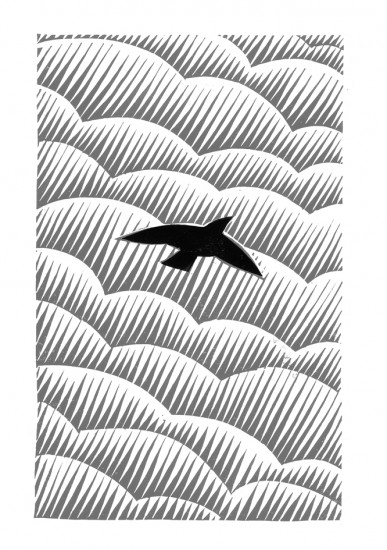 illustration by Jon McNaught
illustration by Jon McNaught
An extract from the new Caught by the River book, On Nature.
The first time a Harris Hawk landed on my fist I was standing in the rain in the middle of a pine forest surrounded by wooden lodges in the dystopian eco-habitat of Centreparcs in Somerset. As part of a group of seven people clad in bright waterproofs with arms outstretched a hawk did its duty and flew from the falconer to each of us in turn. But despite my location and the formulaic atmosphere, experiencing a wild bird fly towards me for the first time – so I could see exactly how the tail feathers push the air to slow the hawk to the point that it can literally step from flight onto my fist – was surely little different to the sensation it must have evoked for the first time in a squire in medieval England or a warrior in Jomon Japan. This was a spectacle, biology, sport, instinct, a privileged insight into wild behaviour and a philosophy of life all merged into one. In the ten years since that experience I have become an avid fan of hawks and falcons. I’ve gone on falconry experience days and holidays and read every obscure book on the subject I can trace. I’ve had barn owls, eagle owls, kestrels, lanner and peregrine falcons, all kinds of hybrids, a merlin and even a golden eagle perched on my fist. I drove for six hours one Saturday morning to the edge of Cornwall from Sussex with my friend Kev once – just on the off chance we might glimpse a Snowy Owl that had got lost on migration. But while I love raptors in all their forms Harris Hawks have always been my favourite. Known as the ‘wolves of the air’ because of their habit of hunting in packs of up to six they are highly social, have the ideal temperament for falconry and a hunting style most accommodating to human beings. Their natural habitat is desert where one of them will scout ahead, others will walk along the ground in the hope of scaring something into movement while those that remain wait above – preparing to strike. The group then share whatever is caught. Going hunting with harris hawks is certainly the most self-contained, dramatic, inspiring and shocking thing I have ever done. It’s important to appreciate that a trained hawk or falcon of any kind bears absolutely no relation to a domesticated pet. Birds of prey only remain with the falconer as long as he or she remains a more efficient food source than the bird could achieve out in the wild. It’s a relationship but by no means a friendship. Even if a hawk or falcon consented to remain with you for 20 years their wild instincts would remain intact. This is why the jesses are made from leather, or sometimes kangaroo skin, because eventually they will rot and fall off should the falcon one day decide it has had enough of you. Everything about the husbandry involved in taking care of a hawk is based with transience in mind. This is as true for a falconry enthusiast in the UK as it is for those who still rely on birds of prey for food and animal skins in the mountains of Kazakhstan. Go there today and you’ll still find men and their sons hawking on horseback with golden eagles on the fist. Sixteen-year-old boys are sent down a cliff face with simple rope to take a juvenile eagle from its eyrie. They train them for six months under the watchful eye of their fathers and then hunt with them for 9 years. After that they release them, grateful for the work they have done (golden eagles can live over 30 years in the wild and up to 80 in captivity). Despite often being bundled up with other country sports falconry is also far more awesome and has little in common with fox hunting, or shooting pheasants or deer. Instead of stacking the odds in your favour with technology or superior numbers you participate in natural behaviour to catch your prey. It might seem a little blood curdling, but I’d rather be a wild rabbit and take my chances with a harris hawk than a chicken in a battery farm. As for enjoying the act of death? Well, to be honest, that’s my least favourite part but I’m of the view that if you can’t bring yourself to kill an animal then you have no right to eat it. Not that the food argument is relevant from a human perspective anyway. Whenever I’ve been hunting with harris hawks they’ve been catching their own dinner.